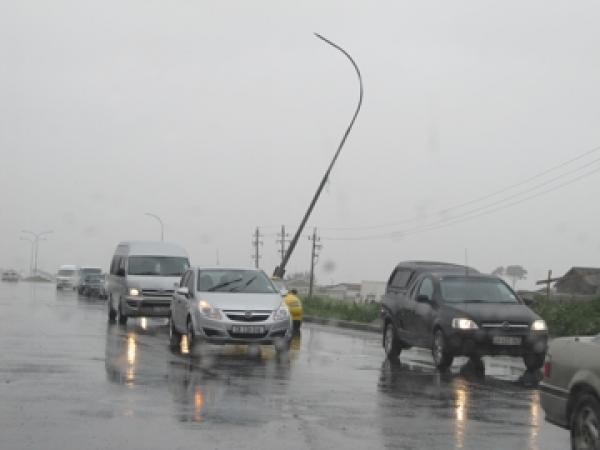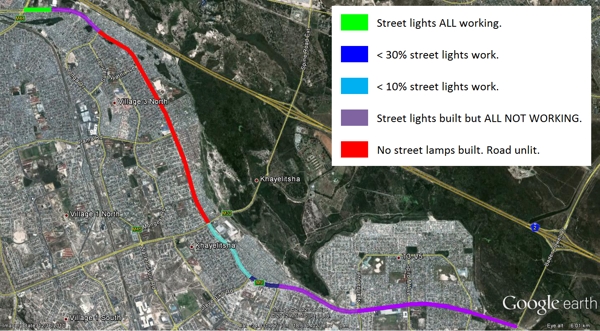Switch on the lights

Providing working street lights is an important part of a city administration’s duties. Street lights help people to walk or drive safely after dark. Last week it was reported that half the road deaths in the Western Cape are pedestrians. Lack of lighting as well as walkways across busy roads are likely among the causes of this.
Street lighting is not only necessary for safety. It is a matter of dignity and being able to live an enjoyable life too. Khayelitsha and many other townships are quiet after 9pm. Few people are brave or mad enough to risk walking about at night, except when they absolutely have to - to relieve themselves for example. Consequently night-life in Khayelitsha is usually either non-existent or dangerous. The problem particularly affects women. When night falls, Khayelitsha becomes especially dangerous for those outside.
Lansdowne Road is one of the city’s main arteries, taking you through most of the major Cape Flats townships. On the evening of 11 September, we drove through Khayelitsha along Lansdowne Road from the Mew Way intersection to Baden Powell drive. The map below shows what we found.

The lights along this 7.5km stretch of Lansdowne Road are for the most part either not working or non-existent. This is a densely populated area; most of the road is alongside shacks. Large and extremely bright floodlights are strategically located near parts of the route. They provide some light to the informal settlements along Lansdowne Road, but most of the route is dark and the paths between shacks are even darker. We do not suggest that providing proper street lighting inside informal settlements is easy. But the city should do much better; it has little excuse for not keeping the existing lights working along a major road like Lansdowne. This is a problem that has existed under both ANC and DA administrations, so neither party should seek political capital from this situation.
This week’s issue has three other articles which report broken street lights:
- Five years and still no street lights on N2 Gateway
- Picking up the pieces left by a corrupt councillor
- It’s still dark in Khayelitsha
In an email from her office in response to one of these stories, Shehaam Sims, Mayoral Committee member for Utility Services in the Western Cape, says:
We also call on the community to please take ownership of their infrastructure. The money spent on replacing vandalised streetlights could be far better spent on new projects for the community.
This unfortunate comment shifts responsibility off the city. Khayelitsha is a township of at least 500 thousand people. It’s not a homogeneous organism in which some fictional community can come together to protect its street lights. The vast majority of Khayelitsha’s residents do not vandalise street lights, but they are also powerless to prevent street lights from being vandalised. Nor can vandalism explain why lights in some areas stay broken for years. The job of keeping the lights on belongs to the elected city government. It will cost more money of course, much more than to keep the lights on in an affluent community like Camps Bay for example. That’s why much more money needs to be allocated to the City’s poorer wards; they have greater needs.
But there is an attitude that limits the amount of support poorer wards receive. It’s a view, prevalent in both the DA and the ANC that elected politicians are responsible to “taxpayers” and “ratepayers”. These two terms are frequently used in interviews and statements made by politicians and officials. They are deeply problematic for two reasons:
Nowhere in the Constitution are these terms used. The Constitution talks about the “People of South Africa” and in some cases “citizens”. Our government has responsibilities and duties towards everyone, not taxpayers specifically.
Nearly every person in the country, whether a rich man in Bishopscourt, a newly arrived immigrant, or a beggar in a city centre, pays tax. Also, poor people pay a much larger proportion of their income as VAT than rich people. And since cities are not supported solely by rates, but national taxes too, every taxpayer contributes to the running of cities. So the terms taxpayer and ratepayer essentially refer to everyone in the country. But this is surely not what’s intended by politicians who use these terms, otherwise why would they not simply say “the public”? (In any case the vast majority of people, especially poor people, would love to be in a financial situation where they have to pay more tax, including —perhaps especially— the millions of people whose sole income is from a state grant.)
What politicians appear to mean when they use these terms is that people who pay income tax are more deserving of service delivery, and also that people who pay more tax are more deserving. This is the only interpretation consistent with the disparate service delivery that is actually happening across this and many other cities in South Africa. But it is inconsistent with our Constitution. Not all, perhaps not even most, politicians believe this of course. Many, consistent with our Constitution, realise that to reduce inequality and improve poor areas, we need to continue investing in social welfare. But at local government level, this is clearly not happening nearly enough. And so the lights remain off for millions of people.
Support independent journalism
Donate using Payfast

Don't miss out on the latest news
We respect your privacy, and promise we won't spam you.

This article is licensed under a Creative Commons Attribution-NoDerivatives 4.0 International License.
